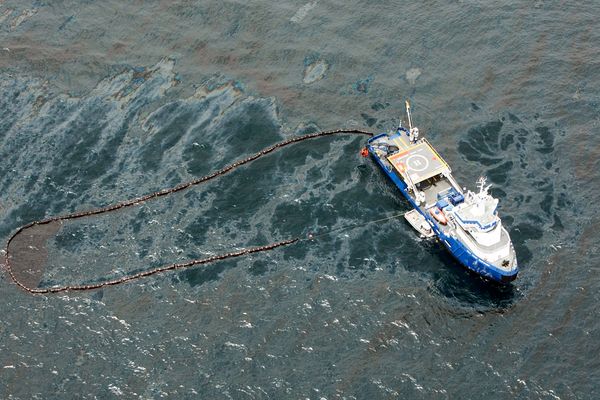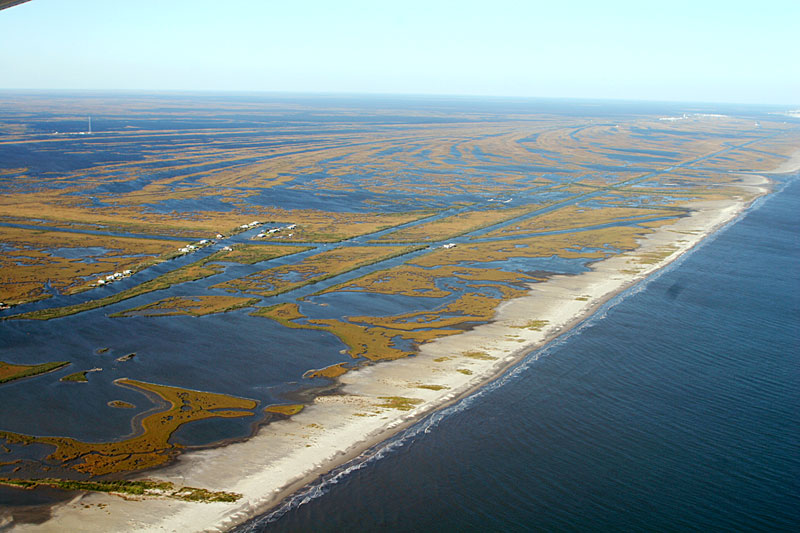The Coast Guard announced on Wednesday that the oil spilling into the Gulf of Mexico and quickly approaching the Louisiana coastland is leaking at a rate of 5,000 barrels per day, 5 times faster than originally estimated.

The U.S. military has joined forces with BP and other groups to stop the leaks as quickly as possible. According to a BBC News article, the spill could surpass the Exxon Valdez disaster in just 2 months.
A third leak was discovered on Wednesday, but officials report that it is most likely new and does not affect their estimates of the amount of oil being released.
On March 20, the oilrig Deepwater Horizon experienced an explosion due to unknown causes, leaving 11 workers missing and presumed dead. Days after the oil rig sank, it was discovered that a leak 5,000 feet undersea was releasing an estimated 1,000 barrels (42,000 gallons) each day.
Reports suggest the oil slick should reach the wetlands of the Louisiana coast on Friday; it is currently 45 miles by 105 miles in size. As of right now, decreasing the damage to surrounding environments and local wildlife takes priority. According to a New York Times article, shrimping boats will be used to gather oil near the wetlands and cannons will be set off to scare away wildlife.
Attempting to estimate the amount of oil being released is a difficult task, especially when the problem is 5,000 feet under the surface of the ocean; it could be compared to a person trying to estimate the number of gallons of water flowing out of a garden hose.
Aside from trying to prevent serious damage to the coastal U.S., the next step involves a massive, 100 ton steel dome that will capture the rising oil and controllably pump it out. The dome device will take weeks to set up and has mainly been tested in shallow waters of less than 400 feet.
The U.S. Government has ordered inspections of all oilrigs in the Gulf of Mexico, but this action comes after criticism of their lackadaisical approach to safety protocol in the oil industry. A remote-control shut off switch, not a functioning element of the Deepwater Horizon, would have given BP the ability to stop the flow of oil, sources say.

Parts of the oil slick were only 16 miles off the Louisiana coast on Wednesday. This area is home to 40% of U.S. wetlands, numerous wildlife, and major fishing spots. Although controlled burnings are reducing the amount of oil in the ocean, it is not a long-term solution. It should be noted that only ¼ of the surrounding wildlife survived the Exxon Valdez oil spill.
This could be the worst oil disaster in history, especially when you consider how distant a practical ending seems. Creating a relief well could take up to three months to stop the rush of oil. Damage to the fishing industry, the environment, and unique wildlife is impending. Hopefully, the next few days will bring better news.

Hey Blogger,When you write some blogs and share with us,that is a hard work for you but share makes you
happly right?,yes I am a blogger too,and I wanna share with you my method to make some extra cash,not too much
maybe $100 a day,but when you keep up the work,the cash will come in much and more.more info you can checkout
my blog.
good luck and cheers!
Pingback: Gulf of Mexico Oil Spill: The Minerals Management Service « 1st World View
Pingback: BP Admits Oil Spill Could Reach 60,000 Barrels a Day « 1st World View
Pingback: Oil Spill Threatening Local Wildlife and U.S. Coastline « 1st World View
That was a great article thank. I was thinking about everything above the ground, I wasn’t even thinking about the turtles and the birds! What I was surprised in about in that article was that no one has been sent down to help with rescue efforts! I hope that has changed! The news clip on the site was great too!
Thanks for finding that for me:)!
Actually danielle, there are ad campaigns aimed at attracting the local citizens of the coastal states in danger to come down and help with clean up.
Hopefully people are giving their time to help with this disaster, but unfortunately no amount of hands-on assistance from citizens will determine whether or not major numbers of animals will be harmed. In a few days, once we know whether or not the containment dome is working successfully or not, we will have a better idea as to how serious the approximate damage could be.
Thanks for the information, I will be checking out the article this weekend:)!
Pingback: Oil Spill Touches U.S. Coast « 1st World View
Hey Danielle, thanks for reading and commenting!
Once you asked the question, I realized I hadn’t looked into a lot of specifics on the wildlife that could be harmed, just general info.
Here is a great article published today from the Daily Comet (Louisiana) that talks about the potential harm to wildlife with this oil spill:
http://www.dailycomet.com/article/20100429/ARTICLES/100429190/1193?Title=Oil-spill-puts-coastal-wildlife-at-risk
According to this article, over 400 species could be affected.
Hey Chris, I know that the wildlife is in danger…but I was wondering if you have read anything about the type of wildlife? I have read little tid bits here and there, but I haven’t had a lot of time to see what is danger. I was also wondering if you have read anything about the steps being taken to protect these animals? I remember the Exxon spill, it was incredibly hard to watch all the animals die. Not to mention the immediate problems with the fishing industries, the economy took a hit with the fish that were not available to eat. People most often talk about the fish that is eaten being lost, lobsters, shrimp, and other popular fish. But I heard about a family of whales that lived in the area, closer to Texas and they were in danger…I was wondering if they were directed out.
Thanks for the information:)